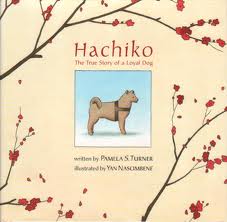Posts tagged ‘dogs’
147. Hachiko: The True Story of a Loyal Dog by Pamela S. Turner
 Retell: Everyday Hachiko accompanies his owner, Dr. Ueno to Shibuya Station and patiently awaits his return. When Dr. Ueno doesn’t return one day Hachiko continues to wait at the station…for ten years.
Retell: Everyday Hachiko accompanies his owner, Dr. Ueno to Shibuya Station and patiently awaits his return. When Dr. Ueno doesn’t return one day Hachiko continues to wait at the station…for ten years.
Topics: dogs, Japan, loss, loyalty, Tokyo
Units of Study: Nonfiction, Memoir
Tribes: mutual respect, appreciations/no put downs
Habits of Mind: persistence
Writing Skills: using imagery, describing setting details
My Thoughts: A colleague of mine gave me this book as a gift knowing my connection with Japan. I taught in Japan for three years. Last summer when I visited Japan again I took a trip to Shibuya Station and learned about the story of Hachiko.
I’m not sure if I’d be able to read this book out loud to my class without crying, or making someone else cry. It’s such a beautiful book though. I can see using this as a mentor text for showing how writers describe the setting. Many of my students have difficulty describing anything but the weather. This text shows how a writer takes time to describe the ‘action’ of the setting–the movement of the crowd, the clothes the people are wearing, etc.
135. Presidential Pets by Laura Driscoll
 Retell: A history of presidents and their beloved pets.
Retell: A history of presidents and their beloved pets.
Topics: pets, presidents, fun, friendship, dogs, Obama, Bo, family
Units of Study: Nonfiction, Content Area
Reading Skills: synthesis, making connections, interpretation
Writing Skills: developing voice in nonfiction
My Thoughts: I picked this book up a few days ago at our school’s book fair. I have a lot of animal lovers in my class who only read nonfiction about animals. This book combines an interest in animals with an interest in presidential history and current events. It’s a nice book for demonstrating how readers can often get distracted by seductive details but must work constantly to think about what the author is trying to say about the topic.
79. Officer Buckle and Gloria by Peggy Rathmann
 Retell: Officer Buckle often visits Napville School to give presentations about safety. Unfortunately, most people do not listen to his advice. As a result, the accident rate is very high. When Officer Buckle partners with a show-stealing police dog named Gloria, suddenly his audience sit up and pay attention.
Retell: Officer Buckle often visits Napville School to give presentations about safety. Unfortunately, most people do not listen to his advice. As a result, the accident rate is very high. When Officer Buckle partners with a show-stealing police dog named Gloria, suddenly his audience sit up and pay attention.
Topics: safety, assemblies, dogs, police
Units of Study: Character, Realistic Fiction
Tribes: attentive listening, appreciations/no put-downs
Reading Skills: reading bold and italicized words
Thoughts: Each year I try and use read alouds to review the agreements of our school. (These are Tribes agreements plus one we call ‘personal best’.) It seems that there are many books about mutual respect, but not very many about attentive listening. Officer Buckle and Gloria is a read aloud I’ve been using for the past two years. The illustrations are great for showing two types of audiences: an audience who does not listen and one that shows they are listening. It also shows how people feel when they are not listened to. There are many bold and italicized words throughout the book. When reading the book aloud you may want to ask students to pay attention to how your voice changes when you come across bold and italicized words.
11. The Whingdingdilly by Bill Peet
 Retell: Scamp is tired of being a dog and wishes he was a grand horse. He runs away and encounters a witch who turns him into a creature called the Whingdingdilly.
Retell: Scamp is tired of being a dog and wishes he was a grand horse. He runs away and encounters a witch who turns him into a creature called the Whingdingdilly.
Topics: dogs, witches
Units of Study: Fantasy, Character
Tribes: Appreciations/No Putdowns
Reading Skills: inference, prediction, making connections
Writing Skills: using a balance of description and dialogue, using interesting verbs
My Thoughts: I really felt for Scamp in the beginning of this book. I’m a sucker for dogs who are down in the dumps. Unfortunately Scamp’s owner, Orvie calls him a “silly old dog” when he catches his dog pretending to be a horse. Though calling someone ‘silly’ may not be the worst putdown heard at school, I can still see using this book as a way to discuss the damage brought about by insults and putdowns. Scamp begins to feel better, and his luck begins to change when he hears how much Orvie appreciates him. The Whingdingdilly also teaches the importance of appreciating ourselves for our strengths rather than putting ourselves down for our faults. This could also be used as a mentor text during a unit on Fantasy writing. The story has a few fantastical elements but is mostly based on reality.
9. Dogteam by Gary Paulsen
 Retell: A moonlit night inspires the narrator to take his dogs on an exciting night ride.
Retell: A moonlit night inspires the narrator to take his dogs on an exciting night ride.
Topics: dogs, dog sledding
Units of Study: personal narrative, content-area writing
Reading Skills: envisionment
Writing Skills: using active verbs, zooming in on a small moment, incorporating sensory details, adding suspense, inserting commas and semicolons, repetition
My Thoughts: Dogteam reads more like prose. In addition to including beautiful imagery, Paulsen’s book has many examples of how writers use all senses to describe a moment in time. Though I would categorize this as a personal narrative, one could also use this as a mentor text for writing nonfiction poetry.
